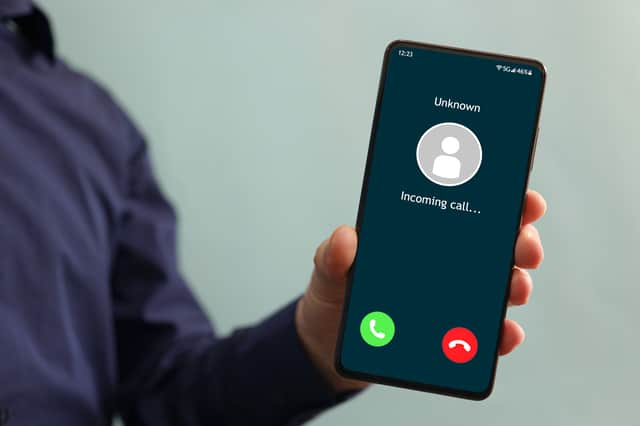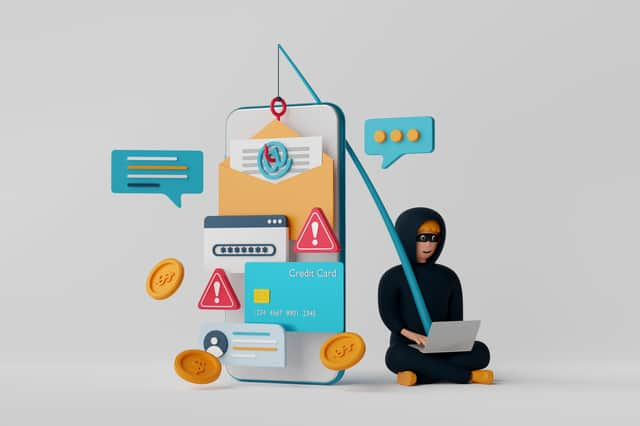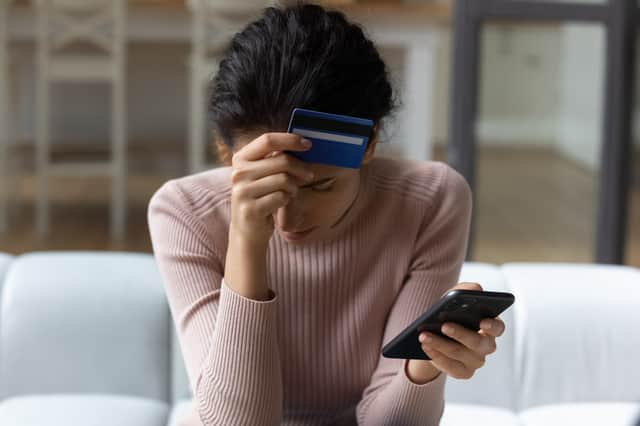Who Called Me UK: How to see who called you, where they are from and how to deal with nuisance callers
If you have a phone of any kind, it's likely that you've received at least one strange call from an anonymous number. Here’s how to find out who’s calling, where they’re from and how to stop it from happening again.
In the UK billions of cold calls are made every year, with consumers losing more than £580 million in the first half of 2023 alone as a result of fraud.
Using techniques such as impersonating trusted organisations to trick victims into giving away personal information, it can be hard to know when a phone call is legitimate.


Advertisement
Hide AdAdvertisement
Hide AdMost phone companies offer built in services which can help identify scam calls, using caller display, if incoming calls are blocked to that number as well as anonymous call rejection, but no method is foolproof.
And even if you're being inundated with nuisance phone calls, sometimes ignoring calls from unknown phone numbers isn't an option.
To help you take back control, here are several ways to establish if you're receiving scam calls and how to uncover who exactly is calling you.
Who called me from this phone number?
To dig more into the phone number calling you, you can do a reverse phone search.
Often detailed information is hidden behind a paywall, but there are online tools that offer free help like Who Called Me.
Number spoofing has become more common and it can be difficult to identify who exactly is calling you and websites such as these allow you to search phone numbers and receive free and insightful data.
You can check if others have reported the number or add your own report, allowing you to gauge how trustworthy it is. It uses colour-coding to indicate the safety level: red for dangerous numbers; orange for those which have been harassing others; grey for unknown; blue for neutral and green for safe numbers.
Phone number area codes: Where they’re from and which to avoid
Scammers often use numbers that come from familiar area codes. You may notice often scam calls arise from UK area codes as this is a tactic to effectively target victims.


Advertisement
Hide AdAdvertisement
Hide AdAccording to anti-scam platform Hiya, these are the top 10 UK area codes used for ‘nuisance phone calls’:
- 020 (London)
- 0161 (Manchester)
- 0141 (Glasgow)
- 0113 (Leeds)
- 0121 (Birmingham)
- 01922 (Walsall)
- 01268 (Basildon)
- 0151 (Liverpool)
- 0115 (Nottingham)
- 01792 (Swansea).
According to Ofcom, missed call scams or "Wangiri" missed call scams. This is when scammers phone someone, then immediately hang up in the hopes of the recipient calling back and connection to an expensive, international number and being charged at a premium rate.
Ofcom warn that these calls typically originate from small or developing countries such as Botswana (267), Guinea (224) or Guyana (592). If you aren't expecting a call from an international number, you should be wary of calling back.
You should also be cautious of calling back dialling codes such as 070 or 076 - which look like mobile numbers but cost more to call - or those from non-geographic numbers like 084, 087, 090, 091 or 118.
Reputable callers will leave a voicemail or call back another time.
How to tell if it's a scam call?


Sometimes it can be hard to identify a scam call just based on a phone number. They can come from live people or automated machines with pre-recorded "robocall" messages.
Here are some suggestions to help you find out if it's a nuisance call:
Run a quick web search
To know if a call is a scam or not, search the number online. The phone number, if legitimate, should generate web page results that show the individual or organisation it's connected to.
Look at what your phone displays
Advertisement
Hide AdAdvertisement
Hide AdWhile receiving a call, check your phone display for a number and location. If your phone simply says ‘Unknown caller’ then it very well could be a scam.
It is recommended that you let unknown number calls go to voicemail and only call back if you’re sure of their identity.
One thing to keep in mind is that anyone can hide their number, and if you're expecting a phone call from someone such as a recruiter or employer there is the chance that they may have blocked their number.
Check for verification
Many mobile carriers verify phone numbers when a call comes through.
For example, the Google phone app shows a ‘badge’ on incoming calls that connects them to a business - you can use this to assess the legitimacy - and Apple users can enable a feature called Silence Unknown Callers.
However, even legitimate businesses may use robocalls.
Keep an eye out for ‘trick’ numbers
Scammers use "spoof numbers" in order to disguise their identity from whoever they are calling.
The call will likely mimic real phone numbers with a few digits changed or use a number with your local area code.
What can you do if you’re receiving scam calls?
If you are receiving unwanted calls (scam or not) then the next best thing to do is just block the number. However, remember these numbers constantly change so you may have to block several numbers before you see results.
Advertisement
Hide AdAdvertisement
Hide AdIt is recommended you also research your mobile carrier’s ‘anti-scam’ solutions. You can use mobile applications like Truecaller that work to deter spoofed numbers.
Lastly, if you are desperate then try the Telephone Preference Service (TPS) which is a ‘Do Not Call’ registry for UK landline and mobile numbers. This allows you to opt out of unsolicited live sales and marketing calls and is free and quick to register.
What to do if you think someone is trying to trick you into handing over money or personal details
If you have received a phone call from someone claiming to be from a trusted organisation such as your bank and you don't recognise the number, hang up.


Go to your mobile banking app or visit your bank's website directly to find a trusted number and compare it to the one which called you.
Alternatively, you can call 159 to contact your bank safely and securely. The number works in the same way as 101 for the Police or 111 for the NHS, and was launched by Stop Scams UK in 2021. There are some limits to the banks which can be contact through the number, so be sure to double check it will work for you.
Should I report nuisance calls?
In addition, if you are receiving scam phone calls or texts it is recommended that you report them.
Most people in the UK can easily report unwanted spam calls by texting the word "Call" alongside the scam phone number to 7726. However, this will depend on the nature of the nuisance call, as there are several contact options.
To report abandoned or silent calls
If you have received a nuisance call where there is no one on the other end or a recorded message is played back, complain to Ofcom.
To report scam calls
Advertisement
Hide AdAdvertisement
Hide AdIf you have been targeted by a scam and you live in Scotland, you should report any instance of fraud or financial crime to the Police on 101 or contact Advice Direct Scotland on 0808 164 6000 to report activity and receive further advice.
If you live in England, Wales or Northern Ireland, you should get in touch with Action Fraud.
To report scams involving premium-rate numbers
If you've been the victim of a missed call scam from a phone number starting with 0871, 070 or 09 contact the Phone-paid Services Authority.
Or if you've received nuisance marketing calls, contact either the Information Commissioner’s Office (ICO) or the Telephone Preference Service (TPS).
Comments
Want to join the conversation? Please or to comment on this article.
